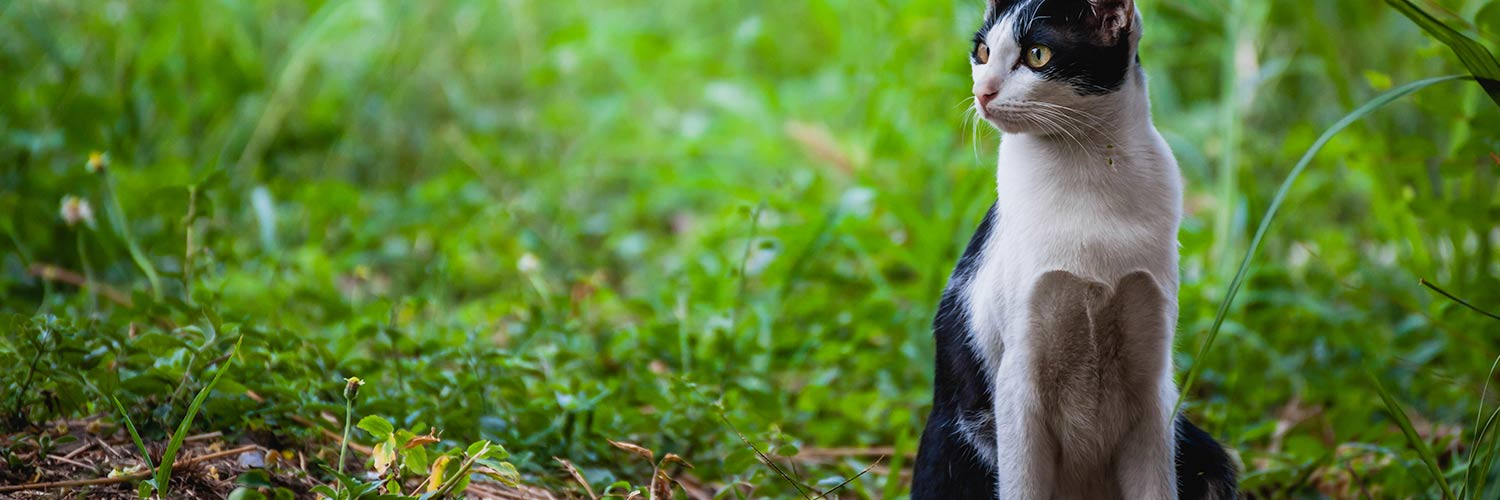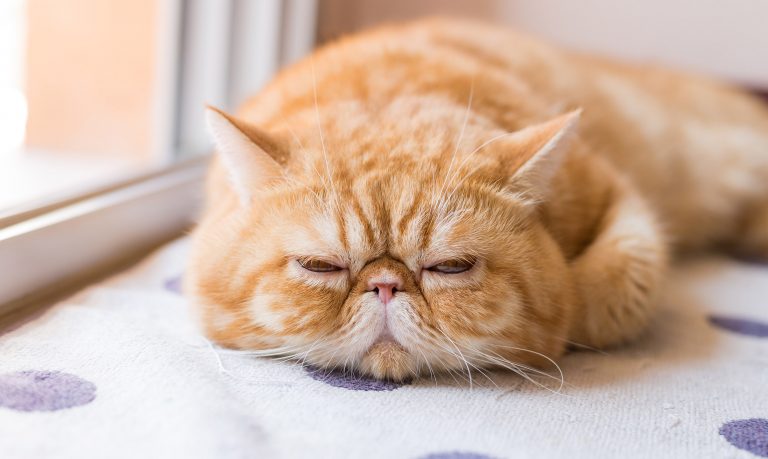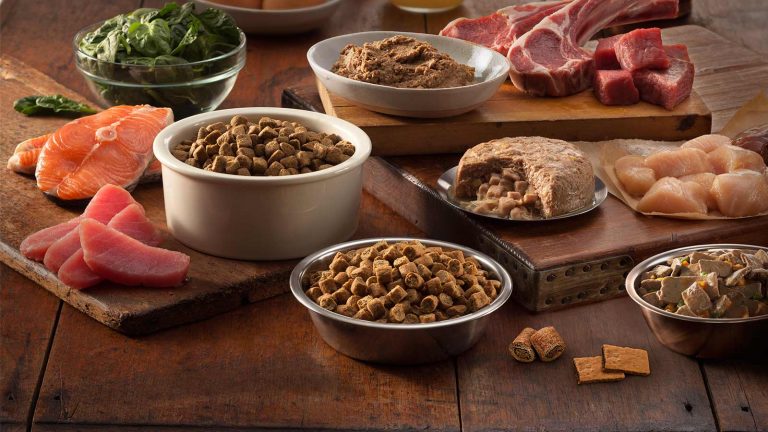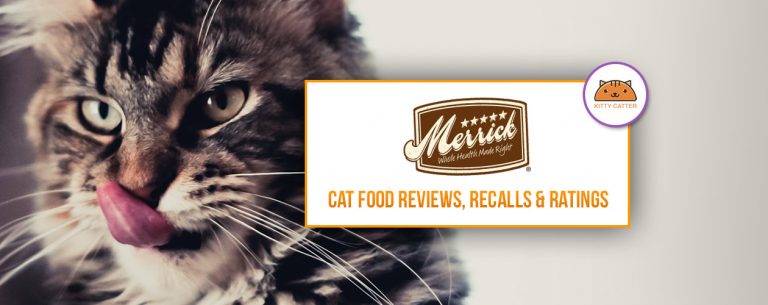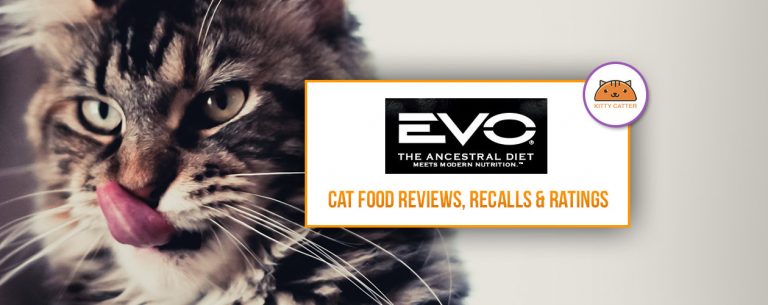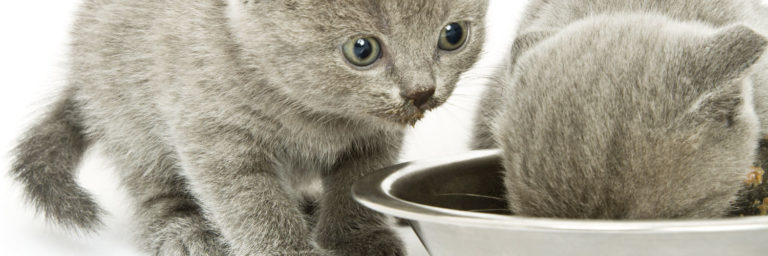Best Cat Food for Constipation: Top 5 Foods to Help Your Constipated Cat
Contents of Article
- What is the Best Cat Food for Constipation?
- What causes a cat to be constipated?
- Food Additives for Cat Constipation
- Best Cat Foods for Constipation 2023
- Stella & Chewy’s Freeze-Dried Raw Absolutely Rabbit Dinner Morsels Cat Food Review
- Weruva Cats in the Kitchen Funk In The Trunk Chicken in Pumpkin Consomme Grain-Free Canned Cat Food Review
- Ziwi Peak Daily-Cat Cuisine Lamb Grain-Free Canned Cat Food Review
- Lotus Duck Pate Grain-Free Canned Cat Food Review
- Nature’s Variety Pride by Instinct Grain-Free Flaked Champ’s Chicken Recipe Wet Canned Cat Food Review
Constipation is defined as “a condition in which there is difficulty in emptying the bowels, usually associated with hardened feces.”
Healthy cats defecate once every day. Anything short of a daily bowel movement is reason for concern. While some constipated cats manage to continue having bowel movements, they tend to strain in the litter box and emit small, short, and dry stool. In a constipated cat, the stool remains in the colon for multiple days, allowing the body to absorb most of the moisture content.
If you notice your cat crying in the litter box, straining to defecate, and emitting short, dry chunks of feces, it’s likely that constipation is to blame. Observe your cat closely; lower urinary tract disease causes behaviors similar to those exhibited by constipated cats.
Untreated, constipation can lead to megacolon, a condition in which the colon is irreversibly stretched.
What is the Best Cat Food for Constipation?
- Stella & Chewy’s Freeze-Dried Raw Absolutely Rabbit Dinner Morsels Cat Food
- Weruva Cats in the Kitchen Funk In The Trunk Chicken in Pumpkin Consomme Grain-Free Canned Cat Food
- Ziwi Peak Daily-Cat Cuisine Lamb Grain-Free Canned Cat Food
- Lotus Duck Pate Grain-Free Canned Cat Food
- Nature’s Variety Pride by Instinct Grain-Free Flaked Champ’s Chicken Recipe Wet Canned Cat Food
What causes a cat to be constipated?
Inadequate Fluid Intake
A diet lacking in adequate moisture is the most common reason why cats become constipated. Instead of drinking from a bowl, our cats’ ancestors found moisture in their prey. A mouse or other prey animal is 70-75% water. The popularity of dry kibble, which has a significantly lower 10-12% moisture content, hasn’t done anything to change our cat’s instincts. Cats have low thirst drives, meaning that they don’t adequately compensate for moisture-deprived dry food at the water bowl.
Among other serious health consequences, chronically dehydrated cats may struggle with chronically dehydrated feces. Dry food is associated with obesity, another risk factor for constipation. Overweight, inactive cats are likely to suffer from constipation. Physical activity stimulates peristalsis or the rhythmic intestinal contractions that help to push waste through the body.
Sometimes switching from dry to canned, homemade, or raw food is a single shot solution to constipation. Veterinarians agree that a high-moisture diet is an important part of preventing the condition. Jean Hofve, DVM, states on her website that “In more than 18 years of experience as a feline veterinarian, I have not personally seen constipation problems in cats who do not eat dry food.”
Intestinal Obstruction
Sometimes constipation doesn’t result from a dietary issue. It’s caused by a physical blockage. Tumors, unpassed hairballs, intestinal twisting, or the ingestion of large indigestible objects, may obstruct part of the intestinal tract. This prevents stool from passing through their body normally.
Litter Box Avoidance
Some cats refuse to use a dirty litter box. Instead of eliminating in the dirty litter box or defecating outside of it, some cats retain their feces and eventually make themselves constipated.
Other Problems
Some cats become constipated when back pain makes defecation painful. Illnesses including irritable bowel disease and some neurological issues can also create constipation in cats. Numerous other problems can lead to constipation, so it’s important to consult your veterinarian if you suspect that something more serious is to blame.
Does raw feeding cause constipation?
Cats who eat raw food tend to have smaller, drier stool than do cats consuming a typical dry or canned diet. Because it aligns with their dietary needs, raw food is utilized efficiently by the cat’s body. Raw diets are often referred to as “low-residue” diets – they don’t leave much waste. Some healthy raw-fed cats defecate as infrequently as once every two days, and this generally isn’t indicative of constipation. To verify that your raw-fed cat has healthy bowel function, refer to the Bristol Stool Chart. While constipated cats tend to release small, hard pebbles, a healthy raw fed cat’s stool is a 3-4 on the chart.
Food Additives for Cat Constipation
Added Fiber
Fiber, also known as roughage, is the indigestible portion of plants. Fiber comes in different forms and exists on a spectrum between entirely soluble and insoluble, fast-fermenting and slow-fermenting. Each type of fiber has a different effect on the body and how it processes waste. Slowly fermenting insoluble fiber increases intestinal transit time and bulks up stool, making it a good choice for cats with diarrhea. Fast-fermenting, soluble fiber has the opposite effect, softening the stool and encouraging it to move more quickly.
We’ve heard that cats have zero physiological requirement for plant matter. How is it possible that strictly carnivorous cats could become constipated because of a fiber deficiency?
Expert opinions vary. Some speculate that, while the natural feline diet contains little to no fiber, it contains indigestible material including fur, bone cartilage, tendons, and ligaments. These bulk up cats’ stool in the same way that added fiber does in most commercially available diets.
Cats with mild constipation sometimes benefit from added dietary fiber. It can help to bulk up the stool and encourage it to pass. In severe cases of constipation and particularly if your cat has megacolon, it’s better to go with a low-fiber diet.
You can easily add fiber to your cat’s diet by sprinkling a trace of psyllium fiber, ground chia seeds, ground flaxseeds, or powdered cellulose on your cat’s meals.
Pumpkin Puree
Pumpkin puree is both high in moisture and relatively high in fiber. It’s one of the most commonly recommended home remedies for constipation, but its effects tend to be temporary. Many cats have improved stool consistency and mobility for a short amount of time, but become constipated again after a few weeks of supplementation. To give your cat pumpkin puree, mix one teaspoon of your cat’s food once or twice each day. Remember to use pureed pumpkin rather than pumpkin pie filling.
Aloe Vera Juice
If the constipation is severe, you may choose to give your cat a gentle laxative. A small amount of aloe vera juice (not gel) can help to get things moving again. Use about ½ a teaspoon mixed into your cat’s food. Because it can cause diarrhea, it’s a good idea to consult your veterinarian prior to giving your cat aloe vera juice.
Slippery Elm Bark Powder
This is a completely safe, non-toxic herbal supplement made from the inner bark of the slippery elm tree. It’s an anti-inflammatory that can treat multiple areas of the body.
Slippery elm is mucilaginous. This property helps to lubricate and soothe the digestive tract. It’s also high in fiber, and like other sources of fiber, slippery elm normalizes digestive function. This normalizing effect makes it a useful treatment for cats with both constipation and diarrhea.
Because it can inhibit mineral and drug absorption, you should avoid using this treatment if your cat is currently following any drug-based treatment plan.
Give your cat ½ of a capsule (100mg) for every 10 lbs of body weight. The capsules should be broken open and the powder mixed with enough cold water to create gruel.
Best Cat Foods for Constipation 2023
Because inadequate fluid intake is the most common cause of constipation in cats, any constipated cat currently eating dry food should immediately start transitioning to a high-moisture food. While some dry foods are marketed as a digestive health solution, they ultimately defeat the purpose by failing to provide the moisture your cat requires.
All of the products on the following list are moist foods made without grains, by-products, or fillers.
Stella & Chewy’s Freeze-Dried Raw Absolutely Rabbit Dinner Morsels Cat Food Review
Rating: 5 out of 5 stars
First 5 Ingredients: Rabbit With Ground Bone, Olive Oil, Pumpkin Seed, Potassium Chloride, Sodium Phosphate Monobasic
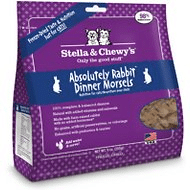
These freeze-dried raw food morsels present a safe, convenient way to get the nutritional complexity of a biologically appropriate raw food diet. When mixed with warm water, the food is a moisture-rich choice for constipated kitties.
Although raw feeding is often associated with fewer bowel movements and drier stool, raw food also has benefits for digestive health that make it a nourishing choice for cats with constipation. In this recipe from Stella and Chewy’s, the natural enzymes in raw meat work in conjunction with added probiotics to encourage healthy gut function while promoting good immune health.
In addition to freeze-dried raw meat, this food contains pumpkin seeds, which are high in fiber and often recommended as a food supplement for cats with constipation. Olive oil is a plant-based fat source. It’s not ideal, but it can help to encourage healthy regularity. – Buy It
Pros
- Freeze- dried food retains the nutritional value of raw meat
- Made exclusively from high-quality ingredients
- After it’s rehydrated, this food is an excellent moisture source
- Probiotics encourage good digestive health
- Free from grains, fillers, and by-products
Cons
- Freeze-dried food demands a few minutes of rehydration time
Weruva Cats in the Kitchen Funk In The Trunk Chicken in Pumpkin Consomme Grain-Free Canned Cat Food Review
Rating: 5 out of 5 stars
First 5 Ingredients: Chicken Broth, Chicken (Boneless, Skinless, White Breast), Tuna, Pumpkin, Sunflower Seed Oil
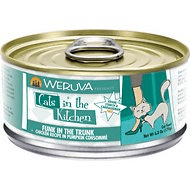
This moisture-rich canned food is popular among people with constipated cats. One reviewer said that after switching to the food, their constipated senior cat was able to “go after 2 weeks”. Others said that it didn’t have any direct effect on their cat’s digestive health.
The recipe is chicken-based with chicken broth and chicken breast, with additional meat protein from tuna. It contains pumpkin, which is commonly recommended for cats with digestive health issues. While a recipe with fewer plant ingredients is ideal, the inclusion of pumpkin can help to regulate digestive function. Pumpkin is low-glycemic and typically not allergenic for cats.
Weruva Funk in the Trunk food contains multiple sources of fat. Sunflower seed oil is not ideal; cats are best-suited to animal fat sources. Fish oil is a healthy source of Omega-3 fatty acids, which can help to keep the skin and coat healthy.
The recipe contains multiple thickeners. These are locust bean gum, guar gum, and xanthan gum.
To make the food nutritionally complete, the recipe concludes with added vitamins and minerals. – Buy It
Pros
- Moisture-rich canned food ideal for constipated cats
- Free from grain, starch, and byproducts
- Made with pumpkin, which is recommended for constipated cats
- Prepared in a human-grade facility
Cons
- Some cats don’t like the taste of this food
Ziwi Peak Daily-Cat Cuisine Lamb Grain-Free Canned Cat Food Review
Rating: 5 out of 5 stars
First 5 Ingredients: Lamb, Lamb Broth, Lamb Liver, Lamb Lung, Lamb Kidney
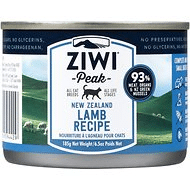
This is a straightforward, meat-based recipe that centers around lamb meat. The ingredient list begins with lamb, lamb broth, lamb liver, lamb lung, and lamb kidney. Chickpeas are included after these meat ingredients, followed by a return to the lamb theme with lamb tripe and lamb heart.
It contains dried kelp, which is a rich natural source of vitamins and minerals. New Zealand green lipped mussel adds natural glucosamine and chondroitin, which help to support joint health. This is particularly beneficial for senior cats, who are both prone to constipation and tend to suffer from joint and mobility issues.
The food is naturally rich in nutrients without resorting to an excessive amount of synthetic supplementation. Ziwi Peak features only high-quality ingredients sourced from New Zealand ranches and waters. – Buy It
Pros
- Moisture-rich canned food
- Centers around nutritious animal ingredients
- Grain-free and made without by-products
- Made from high-quality ingredients
Cons
- An expensive cat food
- Contains chickpeas
Lotus Duck Pate Grain-Free Canned Cat Food Review
Rating: 4 out of 5 stars
First 5 Ingredients: Duck, Duck Broth, Pork Liver, White Fish, Peas
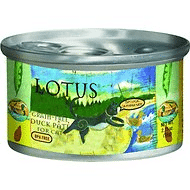
Like all of the foods on this list, this moist food from Lotus is water-packed to hydrate your constipated cat.
The recipe starts with duck, duck broth, and whitefish. The meat ingredients are followed by a variety of fruits and vegetables. The ingredient list includes peas, blueberries, cranberries, carrots, and asparagus. While not a biologically appropriate part of your carnivorous cat’s diet, these ingredients are low-glycemic and are a natural source of vitamins and minerals.
It contains both olive oil and salmon oil. While plant-based oils are not ideal for cats, salmon oil is an excellent source of Omega-3 fatty acids.
New Zealand green lipped mussel is a natural source of glucosamine and chondroitin, which help to keep your cat’s joints healthy. Senior cats tend towards constipation along with joint problems, and it’s good to choose a food that addresses multiple common issues. – Buy It
Pros
- Moisture-rich food is ideal for constipated cats
- Contains salmon oil, which is an excellent source of Omega-3 fatty acids
- Made in a California micro-cannery
- Low cost compared to similar foods
- Free from grains, fillers, and by-products
Cons
- Contains numerous fruits and vegetables
Nature’s Variety Pride by Instinct Grain-Free Flaked Champ’s Chicken Recipe Wet Canned Cat Food Review
Rating: 4 out of 5 stars
First 5 Ingredients: Chicken Broth, Chicken, Chicken Liver, Egg Whites, Spinach
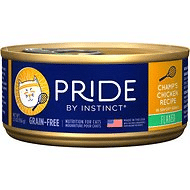
This recipe centers around chicken. The ingredient list begins with chicken broth, followed by chicken and chicken liver. It includes egg whites and whole eggs, which are excellent sources of protein and nutrients for cats. On the negative side, this food contains an additive called “natural flavor”. Although it’s natural, this ingredient is made from unspecified animals. If your cat has allergies or food sensitivities, they may want to avoid foods containing natural flavor.
It contains ground flaxseed, which is commonly recommended as a food additive for constipated cats. This is a concentrated source of fiber that can help to decrease intestinal transit time. Montmorillonite clay also has a spot on the ingredient list. Some say that this clay mineral can improve digestion.
At the end of the recipe for Nature’s Variety Pride, you see some other plant ingredients including dried kelp, artichokes, cranberries, pumpkin, tomato, blueberries, broccoli, cabbage, kale, and parsley. These plant ingredients are not biologically appropriate. However, they do contribute some beneficial nutrients that would otherwise be added to the food via synthetic vitamins and minerals. – Buy It
Pros
- Rich in animal protein
- High-moisture food is ideal for constipated cats
- Contains ground flaxseed, which may help to fight against constipation
- Grain-free and made without by-products
Cons
- Contains numerous fruits and vegetable ingredients
- Made with natural flavor – not ideal for allergic cats

